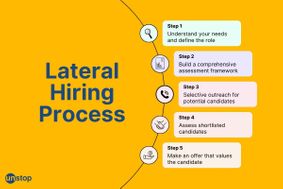- Understanding Behavioural Assessments
- Types of Behavioural Assessment Tools
- Conducting a Behavioral Assessment
- Importance in Various Settings
- Using Behavioral Assessments Effectively
- Summing Up
- Frequently Asked Questions
Behavioral Assessments For Hiring: Methods, Benefits, And Examples

Behavioural assessments are powerful tools that provide valuable insights into human behaviour. Examining personality traits, motivations, and communication styles offers a deeper understanding of why individuals act the way they do.
Whether you're looking to improve relationships, enhance team dynamics, or optimize leadership roles, behavioural assessments can help decode the complexities of human behaviour. By leveraging the information gained from these assessments, you can tailor your interactions and approaches to better connect with others and achieve greater success in both personal and professional settings.
Understanding Behavioural Assessments
Behavioural assessments are valuable tools for evaluating an individual's traits, skills, and potential in various settings. These assessments provide insights into how a person may behave, react, and interact with others. By analyzing responses to specific scenarios or questions, organizations can gain a deeper understanding of an individual's personality and suitability for a particular role.
Employers often use behavioural assessments during the hiring process to determine if a candidate aligns with the organization's culture and job requirements. These assessments can also aid in team building by highlighting complementary skills and personalities within a group.
How They Work
Behavioural assessments typically involve questionnaires, surveys, or simulations that prompt individuals to respond to various scenarios. These responses are then analyzed based on established criteria to generate insights into an individual's behavioural tendencies.
The assessment may include questions about communication style, problem-solving approaches, and decision-making processes. Responses are evaluated against predefined benchmarks to assess compatibility with specific roles or environments.
Organizations use the data gathered from behavioural assessments to make informed decisions regarding recruitment, team dynamics, and professional development initiatives. By understanding how individuals are likely to behave in certain situations, employers can create more effective teams and foster a positive work environment.
Assess candidates with ease! Explore Unstop to find solutions for all your assessment needs.
Behavioural Assessment Methods
Behavioural assessment tools can be categorized into several types, each serving a specific purpose in evaluating behaviour. Some common types of behavioural assessment methods include:
- Direct Observation: This type of assessment involves observing an individual's behaviour in real-time and recording specific behaviours of interest. For example, a teacher may use direct observation to track a student's on-task behaviour during a classroom activity.
- Self-Report Measures: These tools rely on individuals reporting their own behaviour through surveys, questionnaires, or interviews. An example of a self-report measure is the Beck Depression Inventory, which assesses the severity of depressive symptoms based on self-reported responses.
- Behaviour Rating Scales: These tools involve collecting ratings from observers who are familiar with the individual's behaviour. The Child Behavior Checklist is an example of a behaviour rating scale used to assess emotional and behavioural problems in children and adolescents.
- Functional Behavior Assessment (FBA): FBA is a systematic process for identifying the function of problem behaviours. It involves gathering information about the antecedents, behaviours, and consequences to determine the purpose or function of the behaviour. FBA tools include interviews, checklists, and direct observation methods.
- Behavioural Interviews: These assessments involve structured interviews with individuals or caregivers to gather information about behaviour patterns, triggers, and consequences. A behavioural interview may be used to assess social skills or problem behaviours in a clinical setting.
By utilizing a combination of these behavioural assessment tools, professionals can gain a comprehensive understanding of an individual's behaviour and tailor interventions accordingly.
Using Behavioral Assessments in Hiring: A Strategic Approach
Behavioural assessments have become increasingly popular tools in the hiring process. They offer a way to look beyond resumes and traditional interviews to gain insights into a candidate's:
- Soft Skills: Communication, teamwork, problem-solving, leadership, etc.
- Work Style: How they approach tasks, handle pressure, and make decisions.
- Cultural Fit: Alignment with company values and work environment.
Benefits of Using Behavioral Assessments:
- Improved Candidate Selection: By focusing on past behaviours that predict future performance, you can identify candidates with the right skills and temperament for the job.
- Reduced Bias: Behavioral assessments can help mitigate unconscious bias in the hiring process by focusing on objective criteria.
- Structured Interviews: These assessments provide a framework for asking consistent, relevant questions across candidates, leading to fairer comparisons.
- Increased Efficiency: By identifying strong candidates early, you can save time and resources during the hiring process.
Overall, behavioural assessments can be a valuable tool for hiring managers seeking to make data-driven decisions and build high-performing teams. However, using them strategically and ethically is crucial for the best results.
Behavioural Assessment Techniques in Hiring
| Technique | Pros | Cons | Examples |
|---|---|---|---|
| Self-Reported Assessments (Questionnaires) | Easy to administer, provides personality insights | May not predict job-specific behavior, susceptible to self-bias | Myers-Briggs Type Indicator (MBTI), DiSC |
| Situational Judgment Tests (SJTs) | Assesses job-relevant decision-making, problem-solving, work style | Requires development of specific scenarios | Choosing the best response to a customer complaint, prioritizing tasks under pressure |
| Work Sample Tests | Direct evaluation of relevant skills and abilities | Time-consuming to develop and evaluate | Writing a marketing copy, creating a financial model, developing a presentation |
| Behavioral Interviewing (STAR Method) | Uncovers past behaviours that predict future performance, allows for probing | Requires interviewer training and consistent questioning | STAR Method: Situation, Task, Action, Result |
| Assessment Centers | Comprehensive evaluation of skills, teamwork, leadership, and problem-solving under pressure | Most expensive and time-consuming technique | Simulations, group exercises, presentations, role-playing scenarios |
Conducting a Behavioral Assessment
Planning the Process
To begin, identify the purpose and goals of the assessment to ensure alignment with organizational objectives. Next, determine the target audience and select appropriate assessment tools based on their needs.
Consider creating a detailed timeline outlining each step of the assessment process. Allocate resources effectively and assign roles and responsibilities to team members for a smooth execution.
Gathering Data
Start by collecting data through various methods such as surveys, interviews, and observations. Ensure confidentiality and anonymity to encourage honest responses from participants.
Utilize a mix of quantitative and qualitative data to gain a comprehensive understanding of behaviours. Organize the collected data systematically for easier analysis in the next phase.
Analyzing Results
Begin by coding qualitative data to identify patterns, themes, and correlations. Utilize statistical software to analyze quantitative data for accurate insights and trends.
Interpret the results carefully, considering both individual behaviours and overarching patterns. Generate detailed reports highlighting key findings and actionable recommendations.
Importance in Various Settings
In Education
Behavioural assessments play a crucial role in education by helping educators understand students' behaviours and tailor teaching strategies accordingly. These assessments provide valuable insights into students' strengths, weaknesses, and learning styles. By analyzing behavioural patterns, teachers can identify areas where students may need additional support or intervention. This leads to more personalized learning experiences and improved academic outcomes.
- Identify students' unique learning needs
- Personalize teaching approaches based on behavioural insights
- Enhance student engagement and academic performance
In educational settings, behavioural assessments are often used to create individualized education plans (IEPs) for students with special needs. By tracking behaviour over time, educators can monitor progress, adjust interventions, and ensure that each student receives the support they require to succeed academically and socially.
In the Workplace
Workplace behavioural assessments are essential for understanding employees' personalities, work styles, and communication preferences. Employers use these assessments during the hiring process to evaluate candidates' suitability for specific roles. By assessing traits such as teamwork, leadership, and problem-solving skills, employers can make informed decisions about recruitment and team dynamics.
- Assess candidates' compatibility with job requirements
- Improve team collaboration and productivity
- Identify potential areas for professional development
Moreover, behavioural assessments help organizations build diverse and inclusive teams by ensuring that individuals with different strengths and perspectives are brought together. By promoting a culture of understanding and appreciation for diverse personalities, companies can foster innovation and creativity within their workforce.
In Healthcare
In healthcare settings, behavioural assessments are instrumental in diagnosing and treating mental health conditions. Mental health professionals use these assessments to evaluate patients' symptoms, emotions, and behaviours to formulate accurate diagnoses and develop effective treatment plans. By understanding patients' psychological profiles, healthcare providers can offer tailored interventions that address their specific needs.
- Diagnose mental health disorders accurately
- Customize treatment plans for individual patients
- Monitor patients' progress over time
Behavioural assessments in healthcare help improve patient outcomes by identifying risk factors for mental health issues and implementing preventive measures. By integrating behavioural health assessments into routine medical care, healthcare providers can offer comprehensive support to patients and promote overall well-being.
Corporate Use Cases
In the corporate world, behavioural assessments play a crucial role in recruitment and employee development. Companies use these assessments to identify candidates' suitability for specific roles based on their examples of behaviour in various scenarios. This helps in building teams with diverse skill sets and personalities, leading to improved collaboration and productivity.
- Better team dynamics
- Reduced turnover rates
- Enhanced leadership development programs
Using Behavioral Assessments Effectively
Best Practices
- Implementing clear assessment objectives is crucial for obtaining valuable insights into individual behaviours and traits.
- Utilize a variety of assessment tools to gather comprehensive data and ensure a well-rounded evaluation process.
- Regularly update and refine assessment methods to align with evolving organizational needs and industry trends.
- Encourage open communication with employees regarding the purpose and outcomes of assessments to foster transparency and trust.
- Establish consistent assessment criteria to maintain fairness and objectivity in the evaluation process.
Avoiding Common Pitfalls
- Avoid relying solely on a single assessment tool, as it may provide limited perspectives on an individual's behavior.
- Steer clear of using assessments as the sole basis for significant decisions without considering additional factors.
- Be cautious of biases or stereotypes influencing assessment outcomes, leading to inaccurate conclusions about individuals.
- Ensure that assessments are conducted in a timely manner, avoiding delays that may impact their relevance and effectiveness.
- Avoid overloading employees with excessive assessments, as this can lead to fatigue and disengagement from the process.
Summing Up
Conducting behavioural assessments allows you to make informed decisions across various settings, leading to improved outcomes and a better understanding of behaviours. Practical applications of these tools highlight their importance in evaluating and enhancing behaviours. Utilizing assessments effectively can provide valuable insights that drive positive changes and inform strategic decisions. Integrate behavioural assessments into your practices to achieve better outcomes and gain a deeper understanding of behaviours in different contexts.
Frequently Asked Questions
Q1. What are Behavioral Assessments?
Behavioural assessments are tools used to evaluate an individual's behaviour, personality traits, and emotional intelligence in various situations. These assessments provide valuable insights into how a person may react or behave, aiding in decision-making processes.
Q2. Why are Behavioral Assessments Important in Various Settings?
Behavioural assessments play a crucial role in various settings such as workplaces, schools, and healthcare facilities by helping to understand individuals' behaviours, improve team dynamics, enhance communication, and make informed decisions based on behavioural insights.
Q3. How Can Behavioral Assessment Tools be Utilized Effectively?
To use behavioural assessment tools effectively, it is essential to first understand the purpose of the assessment, choose the right tool for the specific context, ensure proper training for administrators, maintain confidentiality, and interpret results accurately to derive meaningful conclusions.
Q4. How Do Examples in Action Enhance Understanding of Behavioral Assessments?
Examples in action showcase real-life scenarios where behavioural assessments have been successfully implemented. By highlighting practical applications and outcomes of these assessments, individuals can better comprehend how behavioural assessments can positively impact decision-making processes and interpersonal relationships.
Q5. What Role Does Conducting a Behavioral Assessment Play in Decision-Making?
Conducting a behavioural assessment enables individuals or organizations to gather data on behaviour patterns, preferences, and tendencies. This information aids in making informed decisions regarding hiring processes, team compositions, conflict resolutions, and personal development strategies based on behavioural insights.
Suggested Reads:
As a biotechnologist-turned-writer, I love turning complex ideas into meaningful stories that inform and inspire. Outside of writing, I enjoy cooking, reading, and travelling, each giving me fresh perspectives and inspiration for my work.
Login to continue reading
And access exclusive content, personalized recommendations, and career-boosting opportunities.
Subscribe
to our newsletter
Blogs you need to hog!

Organize Hackathons: The Ultimate Playbook With Past Case Studies

What is Campus Recruitment? How To Tap The Untapped Talent?

Lateral Hiring: A Complete Guide To The Process, Its Benefits, Challenges & Best Practices












Comments
Add comment